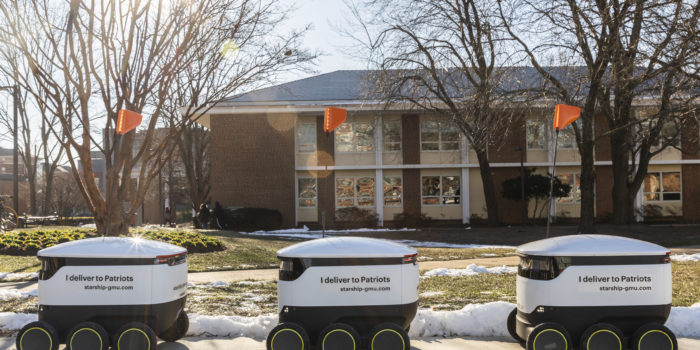Good Monday morning. It’s May 20th. Memorial Day is next Monday. The next issue of Spotlight will be in two weeks on Monday, June 3rd.
Today’s Spotlight takes about 3 minutes to read.
1. News to Know Now
- Breaking news on Sunday that Google has cut ties with Huawei according to Reuters. That means existing Huawei devices lose access to updates of Google applications and new devices cannot use officially licensed versions of Android. The move was reportedly made after the Trump administration added Huawei to a technology blacklist.
- Intuit continues reeling from the fallout over claims that it redirected taxpayers earning less than $66,000 a year away from the free service it partners with the IRS to provide. At least one class-action lawsuit has been filed.
- Google, Facebook, and Twitter have signed on to The Christchurch Call to Action. Nine countries have also adopted the document, although the United States is not one. You can read more about the initiative designed to curtail extreme online posting at The New Zealand Herald.
2. Big Security Issues Looming
Microsoft released a patch for Windows XP last week. But wait, I can hear you thinking. Microsoft stopped supporting XP back in 2014. It’s 18 years old! And yes, you’re correct, which should suggest how bad an unpatched system can get hammered by this ransomware virus. If you don’t have IT specialists, get some. If you simply can’t, make sure that any systems that are running old legacy software aren’t also running Windows XP or Windows 7. If they are, you need to patch them. Windows 8.x and 10.x are not affected. Crazy stat of the day: 1.5% of PCs still run Windows XP according to StatCounter. Others suggest more. That’s millions of computers, folks.
Google’s Titan physical security key also was found to have an exploitable flaw. The problem stems from its connection to a system via Bluetooth instead of being inserted into a USB port. Google says that someone within 30 feet of the security key can communicate with the key itself or the device that it’s protecting. That limits attacks to close physical proximity but still. Google is replacing the keys for free. If you bought one, head to this replacement page.
Google’s more surprising news was that any receipts emailed to your Gmail-based account have been used to create a page on your Google account that lists all of the details for everything you’ve bought online.
I spent some time last week reviewing seven years of my purchases and twelve years of travel information–everything from pizza toppings and the time the pie was ordered to my family’s groceries, our clothing (complete with colors and sizes) to over-the-counter medicines and books about health conditions or other things that I normally wouldn’t want gathered in one place. This was all courtesy of Google purchase tracking–a program that creates a page based on data extracted from any receipt that arrives via Gmail. Conservatively, there are around 400 orders with several thousand items.
Click this link to view your purchase history tied to your Google account.
The data even populates if you forward multiple emails into one big email account. The only time that I found it didn’t populate is if an order was placed on my work email, which is commercial-grade Gmail and probably blocked from overtly gathering that data.
The only way to delete the information is to delete the receipts in your email. Then you can go to your account preferences (click here) and under “Private Results” select the option that reads “Do not use private results”. Even if you delete the data from your account, you must understand that you likely won’t remove Google’s access to that data which is undoubtedly stored on their systems.
Before you do all that, have a look at Google using your private search data with these search query commands. Simply log into Google’s main search page at Google.com, make sure you’re signed in to your account, and type one of these commands.
- my packages
- my reservations
- my events
- my flights
- my photos
- oh yes, and my bills
3. Also In the Spotlight
- Amazon started selling tiny homes–little $7K sheds with a bedroom (no bath) and outside area for your backyard. Then they sold out. (Real Deal Real Estate News)
- Quora, the annoying question-and-answer bazaar, is closing a $60 million round that values the company at $2 billion, and I just can’t anymore. (Vox)
- MailChimp finally unveiled their integrated marketing platform that includes a lot of what has been offered piecemeal: landing pages, Facebook advertising, postcards, etc. Existing customer pricing stays intact (thanks!). Their revenue projection is $700 million from 11 million active customers. (TechCrunch)
4. Protip: Google Sheets New Features
Google Sheets, their Suites spreadsheet entrant, has two nifty new functions: remove duplicates and trim white space. Both put Sheets’ usability back into rough parity with Excel.
Find them in the menu bar under “Data” and just below the always-helpful “Split Text into Columns”.
5. Great Data
Netflix data viz engineer Susie Lu has updated the humble grocery store receipt. Fast Company covered how she used a mix of bar graphs and bubbles to create better visualizations of what you spent $213 on after running in to the store for bread and two cans of dog food.
You know this is hardcore when you read, “… the printer could not draw horizontal lines, which meant she had to use various visual tricks at the pixel level to create her bar charts, along with the tiny icons of bread, dairy, and meat that she designed, too.”
Check the tale of the tape here.
6. Coffee Break

That’s a picture of Sean Tighe, Bernie Waldron, and John Devanney from Bellyhaunis in County Mayo. They were in Times Square recently and asked a lass to take a picture for them. “We’ll find it someday,” they told her.
And so they did after she posted this image on Twitter. Read CNN’s fun story on how it took Irish Twitter all of an hour to identify the men and link them with the person who did a good deed in taking their picture.


